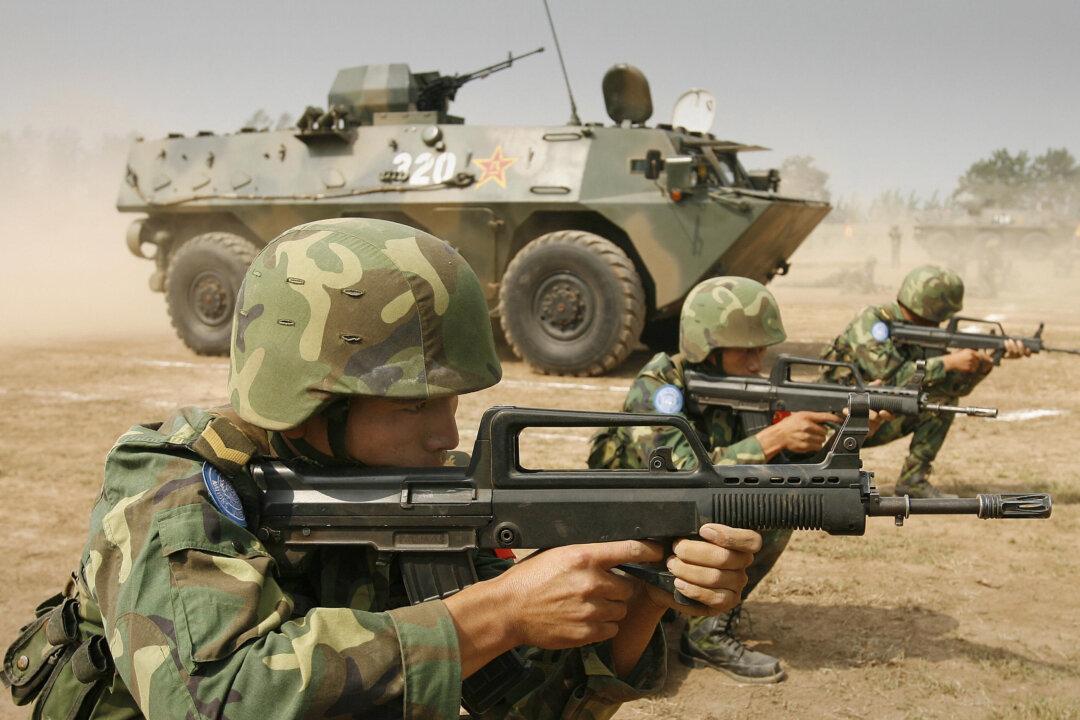Delays to the funding of U.S. aid and military activities in Africa and the Middle East could significantly boost the threat of attacks on American interests, a senior Defense Department official and two regional commanders told a hearing of the House Armed Services Committee on March 23.
Celeste Wallander, assistant secretary of defense for international security affairs, U.S. Central Command (CENTCOM) commander Gen. Michael Kurilla, and U.S. Africa Command (AFRICOM) commander Gen. Michael Langley all agreed that China’s and Russia’s increasing influence in those areas, as well as Iran’s nuclear ambitions, require a more comprehensive, more focused response from Washington.
Kurilla also said terrorist organizations, primarily ISIS and al-Qaeda, have the capabilities to launch an “enabled attack against U.S. or Western interests abroad” within six months.

Rep. Mike Rogers (R-Ala.), the committee’s chairman, set the tone for the hearing when he referred to China’s recent “peacemaker” role that resulted in a normalizing of relations between Iran and Saudi Arabia.
International relations experts say the agreement between Riyadh and Tehran could transform the Middle East by ending the current Arab–Iranian divide while aligning the region with the regime in Beijing.
China’s brokerage “provided a lifeline to Iran at a very dangerous time,“ Rogers said. ”The Ayatollah continues to fund and equip terrorists targeting American troops; he’s providing [Russian President Vladimir] Putin with advanced weapons to perpetrate the brutal invasion of Ukraine, and his regime is aggressively pursuing nuclear weapons. We absolutely cannot allow that to happen.”
He said President Joe Biden’s decision to “unilaterally and unconditionally withdraw” U.S. forces from Afghanistan undermined national security.
“It has left a security vacuum with the Taliban, al-Qaeda, and ISIS filling that vacuum. The assessment is that some of these terrorists could attack the U.S. within as little as six months,” Rogers said.
“I remain very concerned that we are no longer in a position to detect an imminent attack and stop it. That’s because the president’s so-called Over the Horizon counterterrorism strategy is a farce.
“Without reliable partners on the ground and nearby facilities to launch assets, our ability to strike these terrorists is severely limited. We cannot allow for blind spots, especially in [Africa and the Middle East].”

Rogers said the lack of adequate resources for U.S. troops in Africa has led to a worsening security situation, “especially in the west, where terrorist havens are expanding.”
He and other committee members expressed concern about the presence of Russia’s Wagner Group mercenaries in Africa, where it was propping up illegitimate regimes such as the one in Mali.
“We’ve seen the coups and the violence and the chaos that has followed,” said Rep. Adam Smith (D-Wash.), the panel’s ranking Democrat member.
“Certainly, we continue to have the challenge of the violent extremist organizations operating there, but Russia and China’s presence is making that worse.”
He called for a greater American understanding of the reasons why more countries in Africa and the Middle East are working more closely with Beijing and Moscow.
“There are things they see to their individual country’s advantage. It’s not enough for the U.S. to show up and say, ‘We’re better than them; you have to be with us.’ We have to understand in great detail why these countries are working with China and Russia,” Smith said.
“What is being offered by China and Russia that we aren’t offering? How can we effectively counter that ... to make sure China and Russia don’t begin to have dominant control in those parts of the world?”
He said he was particularly concerned about al-Shabaab in Somalia, which continues to be the “most well-organized and effective arm of al-Qaeda. President Trump’s unilateral decision in the dying days of his administration to simply pull out of Somalia without any sort of plan to follow up also had consequences.”
Wallander said her department would continue to work with partners in Africa and the Middle East to “disrupt” terrorist activities.
“We will continue to stand with our partners and allies to win what we view as the competition of coalitions that is becoming increasingly critical to our common security,” she said.

The U.S. advantage in achieving objectives such as denying Iran a nuclear weapon is in its ability to work alongside “capable partners” in coalitions, Wallander noted.
“While others seek to strategically compete, there is no combat-credible, willing alternative prepared to share cutting-edge capabilities and invest vital national resources in support of regional security and defense of others within the rules-based international order,” she said.
Washington can’t afford to overlook Africa’s geopolitical importance to U.S. national security, according to Wallander.
“Many of the world’s most pressing challenges and global solutions will emanate from this continent as it continues to grow in political and economic power,” she said.
But Wallander said Africa’s “extraordinary potential” remained threatened by political instability, democratic backsliding, transnational threats, and the “entrenched and growing presence” of extremist groups.
“In East Africa, we remain steadfast in our support of regional initiatives to combat the threat from al-Shabaab in Somalia,” she told the committee.
“In West Africa, we remain focused on countering ISIS and JNIM [militant Islamist coalition Jama’at Nusrat al Islam wal Muslimeen] by investing in and supporting our security partners.
“The security situation continues to deteriorate in the Sahel and coastal West Africa. Growing threats presented by VEOs [Violent Extremist Organizations], governance challenges, and lack of development opportunities have exacerbated conflicts in the region.”
Wallander said recent changes of government in “key” African nations “challenge U.S. military assistance, as well as access and influence to help counter advances by malign actors, namely Russia and China.”
“The PRC [People’s Republic of China] is the only country with the intent and, increasingly, the capability to fundamentally reshape the rules-based international order,“ she said. ”Africa is key to U.S. strategy to prevent the PRC from achieving its objectives.”

China has built an extensive military base in Djibouti in the Horn of Africa, barely six miles from a U.S. base. The regime also has announced that it wants to build a “spaceport” there, as well as a naval base off the coast of West Africa, to give its warships access to the Atlantic.
Langley expressed concerns about the strategic implications of those developments and noted that if they were to come to fruition, China could “establish a platform for power projection.”
“That changes America’s strategic calculus going forward,” he said.
To prevent that scenario, Langley argued that Washington had to use all means at its disposal to ensure the U.S. was African nations’ “partner of choice.”
“In my travels across the continent, I know that our partners don’t want to be militarized in a strategic sense,” he said.
Langley warned that threats that had once been contained on the African continent are transforming into global dangers.
“Terrorism, poverty, food insecurity, climate change, and mass migration shatter African lives. They sow the seeds of violent extremism and Russian exploitation,” he said.
“Russia’s Wagner mercenaries turn chaos into cash and destabilize entire regions across the African continent. It cuts at American interests worldwide.”
Langley said terrorist organizations, including ISIS and al-Qaeda, are growing in strength in Africa and pose a direct and immediate threat to U.S. lives.
“Solutions to these colossal problems must be a shared burden,” he said.
“African nations need to be at the helm of concerted international efforts to produce sustainable outcomes. Assisting African nations in achieving their goals while advancing American interests can only be accomplished through a synchronized whole-of-government strategy.”
Langley’s message was that Africa needed military aid and training, as well as development aid.
“We call it the 3D approach: The toolkit of diplomacy, development, and defense,“ he said. ”But one tool does not succeed without the whole kit. So I will advocate for State Department and USAID partners to receive the resources they need to succeed.”
Kurilla told the committee that Iran remains the “primary destabilizing element” in the Middle East, fueled by its strengthening alliances with China and Russia.
“We’ve seen rapid advances in Iranian military capability over time. The Iran of 2023 is not the Iran of 1983 [when CENTCOM was formed]. Iran today is exponentially more militarily capable than it was even five years ago,” he said.
“Today, Iran possesses the largest and most diverse missile arsenal in the Middle East, with thousands of ballistic and cruise missiles. Iran also maintains the largest and most capable UAV (Unmanned Aerial Vehicle) force.
“Iran’s vast and deeply resourced proxy forces spread instability throughout the region and threaten our regional partners.”

Kurilla noted that Tehran continues to enrich uranium “far above” what was needed for commercial use.
“Iran can enrich uranium faster than it could even two years ago. An Iran with a nuclear weapon would change the Middle East overnight and forever,” he said.
Kurilla says his troops will continue to fight ISIS in the region, although he’s particularly concerned about the situation in Afghanistan.
“In Afghanistan, ISIS (in Khorasan province) seeks to expand its ranks and develop the capability to inspire, enable or direct attacks in the region and beyond, with the group’s ultimate goal to attack the U.S. homeland,” he said.
Amid these challenges, the strategic competition is “deeply manifest” in the Middle East, according to Kurilla.
“The PRC aggressively expands its informational, military, and economic instruments of national power across the region, and now Beijing seeks to establish its diplomatic influence,” he said.
He pointed out that China is dependent on the Middle East for more than half of its imported crude oil and more than a third of its natural gas. However, it’s moving far beyond energy investments “to encompass physical and telecommunications infrastructure that advances its Belt and Road [BRI] initiatives.”
“Nineteen of 21 CENTCOM countries have signed a BRI agreement with China,” he said. “We are in a race to integrate with our partners before China can penetrate the region.”
Kurilla also warned that Russia is attempting to expand its influence in Syria, “seeking a permanent basing there and undermining our efforts towards stability and security.
“Putin seeks a foothold of influence in the central states, leveraging ... a perceived decline in U.S. engagement to challenge our influence in this area of the world,” he said.
Kurilla said the Middle East “holds the greatest risk of derailing the national defense strategy with a flashpoint international incident that may demand a response using unplanned resources or attention.”
CENTCOM is cultivating “deep, abiding partnerships that can serve as a hedge against threats in the region while deterring Iran from its most destructive behavior,” he said.
“China views our partners as merely customers and clients,” Kurilla said.
To prevent future attacks on U.S. targets, he told the committee that CENTCOM requires additional resources to increase intelligence collection efforts in Afghanistan.
However, there’s a concern that the House won’t approve defense authorization measures in a timely manner, Rogers said.
Langley and Kurilla responded that funding delays would affect their forces’ readiness to respond to threats.
“The violent extremist organizations, and the layered threat of the PRC, also Wagner’s actions, increase risk,“ Langley said. ”A delayed budget will hamper our efforts to address these challenges.”





